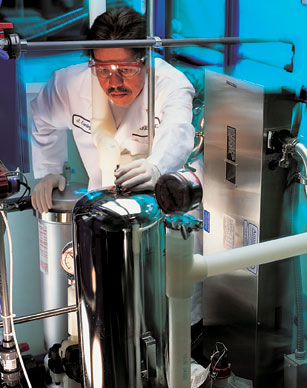
We develop our own products. We also out-license our TAP technology to other companies so they can develop TAP products with their proprietary antibodies. Our technology out-license agreements typically include an upfront payment and milestone payments that potentially total about $40 million, plus royalties on product sales.
Three companies – Millennium, Boehringer Ingelheim, and Genentech – have licensed the right to use our TAP technology with their antibodies to specific targets. Separately, Genentech, Millennium, and Abgenix have purchased the right to test our TAP technology with their antibodies to additional targets.
Through our internal programs and our out-licensing activities, four TAP product candidates have advanced into clinical testing: the ImmunoGen-developed compounds huN901-DM1 and cantuzumab mertansine, and the partner-developed compounds bivatuzumab mertansine and MLN2704.
We developed huN901-DM1 for the treatment of small-cell lung cancer and other cancers that express CD56. Small-cell lung cancer is a highly aggressive cancer with a median survival time of less than a year. This compound is being developed in conjunction with British Biotech, who refer to it as BB-10901. They are responsible for its clinical development program and have marketing rights for Europe and Japan. We retained these rights in the United States and the rest of the world and also hold the manufacturing rights.
A Phase I/II study is underway with huN901-DM1 in the United States. In the Phase I portion of the study, completed in November 2002, the compound was found to be safe to administer on a weekly basis and to demonstrate evidence of anticancer activity. Study investigator Dr. Anthony Tolcher presented the findings at an international cancer conference. In the Phase II portion now underway, the compound is being evaluated specifically in patients with relapsed, but not necessarily refractory, small-cell lung cancer. A separate Phase I study is underway in the United Kingdom that examines dosing huN901-DM1 daily for three days followed by an eighteen-day recovery period.
Our other compound that has advanced to clinical testing, cantuzumab mertansine (formerly called huC242-DM1/SB-408075), was developed for the treatment of cancers that express CanAg, such as colorectal, pancreatic, gastric, other abdominal cancers, and many non-small-cell lung cancers.
Cantuzumab mertansine has been evaluated in Phase I studies conducted primarily in patients with treatment-resistant colon cancer, and it was found to be well tolerated and to demonstrate evidence of biological activity. Evidence of anticancer activity included tumor shrinkage and stable disease in patients with different types of CanAg-expressing cancers, and reductions in CEA levels – a marker for colon cancer progression – in patients with colon cancer.
In 1999, we licensed rights to the compound to SmithKline Beecham, which subsequently became GlaxoSmithKline through a merger. In June 2002, GlaxoSmithKline informed ImmunoGen that advancement of the compound into Phase II testing was dependent on renegotiation of the licensing agreement. While both companies negotiated in good faith, a mutually acceptable revised arrangement could not be achieved and in January 2003 ImmunoGen ceased negotiations and regained the product rights. ImmunoGen intends to re-partner cantuzumab mertansine for further development and commercialization.
TAP product candidates developed by our partners also have begun clinical testing.
The large, private pharmaceutical company Boehringer Ingelheim developed bivatuzumab mertansine using our DM1 effector molecule with their anti-CD44v6 antibody. In September 2002, Boehringer Ingelheim began clinical testing of this compound, which triggered a milestone payment to ImmunoGen.
Similarly, Millennium developed MLN2704 using our DM1 effector molecule with their MLN591 antibody. This antibody targets the prostate specific membrane antigen, or PSMA. In November 2002, Millennium announced they had initiated a Phase I dose escalation study with MLN2704 in patients with metastatic androgen-independent prostate cancer. This achievement triggered a milestone payment to ImmunoGen. Millennium has noted that they are encouraged by the preliminary findings with MLN2704.
We also have active partnerships with Genentech and Abgenix. For example, ImmunoGen and Genentech continue to conduct preclinical studies related to use of our TAP technology with their trastuzumab (Herceptin®) antibody.
Over the past year, ImmunoGen made important progress with huMy9-6-DM1, our anti-IGF-IR antibody, and our product for B-cell malignancies. We are pleased to have Aventis as a partner for these compounds going forward, as well as for the new therapeutics we develop together.

British Biotech (in certain territories)
Undisclosed